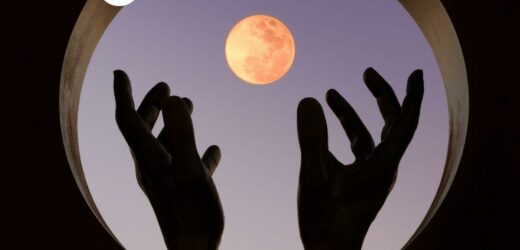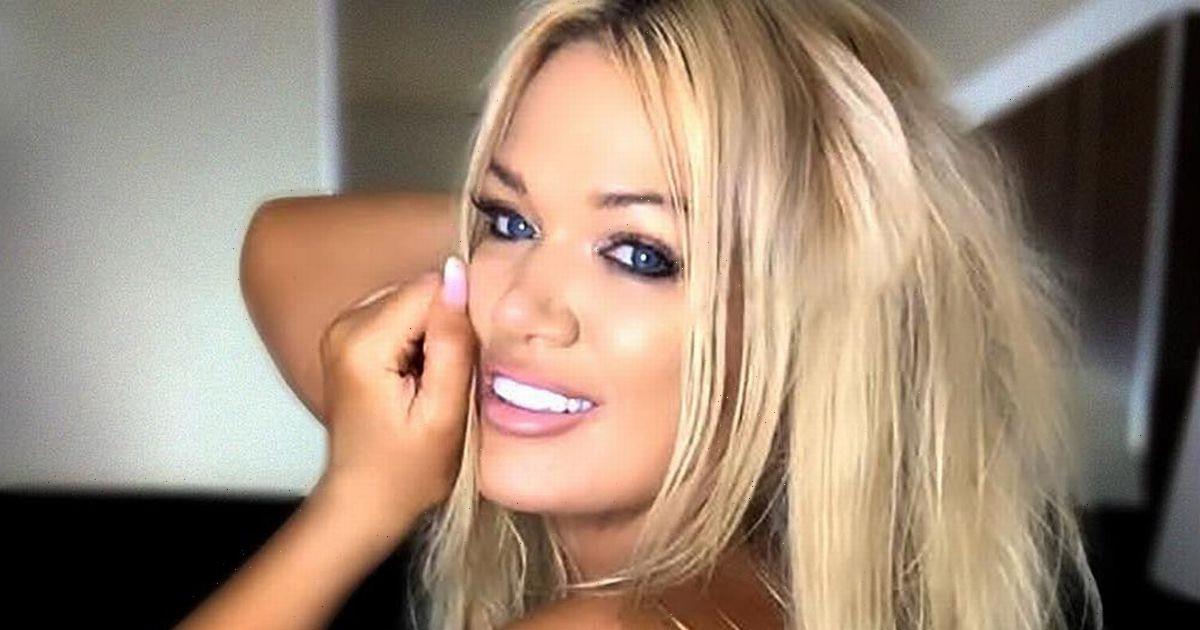Written by Elle Hunt
Here’s everything I learned about how we all lost trust in our own instincts – and how we can channel them for the better.
For a moment, I worry that the connection has dropped out – but the young woman on the other end of the Zoom call has just fallen silent. Her eyes are shut, her Airpods are in, and her hands are held in prayer position under her chin as she turns her attention inwards – and onto me. “All right,” she says finally, her eyes still closed. “I’ve found you.”
Fleur Leussink is a psychic medium and according to Lana Del Rey, one of her celebrity clients, one of only a few such “truly gifted” people in the world. True enough, her waitlist is three years long; I’ve jumped the queue to experience Fleur’s intuitive insights for myself, following the publication of her book Moving Beyond.
We’re about to begin an hour-long reading about my future – but, Fleur says, she’s not going to tell me anything that I don’t already know.
You might think that the mark of a pretty poor psychic – if an honest one. But Fleur describes her work as not so much seeing into the future as revealing the path we’re on. As well as giving these one-to-one readings, gazing into the future and communicating with the dead (both listed on her website at a price of US $695, or around £580), she is also an intuition coach, showing people how to tune into their subconscious knowledge for clarity and confidence.
“So many of us, especially women, have a deep knowing, but have been socially conditioned not to listen to it,” says Fleur. “Whether it’s the desire to have children, quit your job or move to another place, most people turn to somebody else and say: ‘What do you think? Is that a good idea?’ There’s a panic, almost, of needing external validation.”
Fleur teaches people how to trust themselves, she says. “We all have intuition, and if you can turn the volume up on that… the end result is confidence.”
I knew not to expect any draped velvet or crystal balls from Fleur’s slick PR and her supplied headshots, showing her to have the polished, professional glam of a concert cellist. Even so, I’m struck by how friendly and down-to-earth she is: less supernatural spirit guide than girl next door. Between her fresh face, loose sweater and neon nails, Fleur seems less ‘woo’ than much of wellness Instagram.
Her path to becoming a celebrity psychic was unexpected. Fleur spent her early childhood in the Netherlands before moving with her parents to Texas. She had her first ‘spirit visitation’ aged six and her dad would take her to pick lottery numbers (they never won – that wasn’t the purpose of her gift, she says – but they had a lot of fun trying).
Fleur later enrolled at University of California, Los Angeles, to study neuroscience with a view to becoming a doctor. But an unknown illness in her first year of college led her to start meditation and reconnect with what she now saw as her purpose. She gave her first readings from the walk-in closet in her shared college room.
Fleur acknowledges the apparent crossroads between aspiring neuroscientist and successful psychic. But, she says, both are working with the subliminal. “I really see a psychic as being an ambassador to your own knowing… helping you to bridge it, rather than it being hidden beneath the surface.”
What she’s about to tell me is not information pulled out of the ether or accessible only to her: “I’m finding it within your energetic space, and we’re just bringing it into conscious awareness,” Fleur says. “It is all within you, ultimately.”
I want to be open-minded, but at the mention of my ‘energetic space’, I’m sceptical. Fleur likens it to my own radio frequency, by which she can reach me in Hertfordshire all the way from her home in Lisbon. Even if that’s so – I think from my stuffy coworking space on the hottest day of the year – right now, I fear all she’ll get is static.
Anyway, I’m down for a ‘future-gazing’ reading: if I don’t know what lies in store for me, how can Fleur?
“Everyone is constantly shaping the future,” she says, without prompting, like she really has tuned into Elle FM – we just might not be fully cognisant of how. “We think about our actions and decisions – and sure, that’s maybe 15% of it. But underneath the surface, we’ve got beliefs, points of view, habits and values. That’s really what’s driving that conscious decision.”
By bringing those hidden factors to light, Fleur’s clients can consider the path they are on and any course corrections they’d like to make. “That being said,” she says, suddenly brisk, as if a liability waiver has just crossed her desk, “is there anything you don’t want to know?”
I laugh nervously. “I’ll let you know,” I say.
“You’re OK with knowing about your health, illness, passings…” says Fleur, putting her hair up into a businesslike bun.
“Why not,” I say. “Better to know.” I sound cavalier, even flippant – but I’m surprised to feel a sense of trepidation about what my intuition is about to reveal.
Whether or not we believe in psychics, most of us will have experienced some knowledge beyond ourselves that we can’t quite account for but feel – strongly and instinctively – to be true.
These can register as major or mundane – from the sudden thought of a friend who might appreciate a call to those astonishing stories we’ve all heard about people getting off planes that later crashed or otherwise preempting disaster. As New Yorker journalist Sam Knight writes: “Premonitions are impossible, and they come true all the time.”
In his new book, The Premonitions Bureau, Knight describes a British psychiatrist’s investigation into ‘mass premonition’, sparked by dozens of compelling accounts apparently predicting the Aberfan disaster of 1966. One hour before the catastrophic tip spill in South Wales, one woman had reported waking in her north London home and “choking and gasping and with the sense of the walls caving in”.
The psychiatrist John Barker had sought to bring together these ‘human seismographs’ so that they might inform an official national early warning system. But neither he nor Knight, returning to the subject half a century after Barker’s death in 1968, were able to categorically prove or disprove their existence, meaning the question of precognition remains open-ended.
Fleur says she had her own close call while travelling solo through Cambodia. For three consecutive days, she woke up with the thought that she should buy travel insurance. Her trip was almost over; she almost waved it off but gave in to the hunch. Two days later, she was in a serious car accident. “The scar on my leg will remind me to never doubt my inner voice again,” she says.
At the most basic level, many of us will have experienced ‘gut feelings’ about someone or something that later prove to be sound. We may even rely on them day-to-day, as studies have shown is the case for dentists and chess masters. But all of us, it seems, can benefit from tuning into our intuition.
In 2016, researchers at the University of New South Wales in Australia published findings that ‘nonconscious emotional information’ – in line with the common understanding of intuition – could lead to faster, more accurate and more confident decisions. They also found that accuracy improved over time, indicating to them “that intuition might indeed be something that can be improved with practice”.
Amanda Henwood, from the department of psychological and behavioural science at the London School of Economics, says some situations lend themselves better than others to intuitive thinking. “If you’re approaching a scenario that you’ve experienced a million times, your intuition is more likely to be accurate because it’s relying on data from those past experiences,” she explains.
The inverse is also true: if your gut feeling goes against your typical or habitual tendencies, that “may be a sign from your subconscious that there is something potentially important there”, says Henwood.
Otherwise, it can provide a helpful steer if you are short on either information, time or energy – in low-stakes scenarios in particular. Some decisions just aren’t consequential enough to warrant a great deal of analysis, says Henwood: “If you have too much information to process, intuition might be helpful.”
But, wherever possible, she advises a combined approach – where you listen to your intuition but also challenge it with more traditional thinking.
Fleur says the same: all sources of information should inform our individual compass. “But that intuition cannot rise to the surface when there’s no space for it,” she adds. Now, between the pandemic and uncertainty about the future, it might be harder than ever. “With fear comes a heightened sense of the external,” says Fleur. “You have to come back to the self.”
She suggests starting to pay closer attention to your thoughts so that intuition might be distinguished from imagination, anxiety and fear. Each will register differently in your mind and body, says Fleur. “For me, intuition is like a thought that comes out of nowhere: I can’t point to an emotional trigger or say that I was thinking about anything related.”
It is not attached to any negative feeling in her body, she says, and it is not on a repeating loop. She can also replay the thought without being able to recreate the feeling it arrived with: that ‘lightbulb moment’. Those are her telltale signs, Fleur says – but everyone’s will be different.
Meditation, therapy, movement such as yoga or walking, journaling or some other practice to quieten the nervous system and shift awareness can help to reveal those patterns, and “help intuition to flow”, she says.
Seen in that perspective, Fleur’s approach to calibrating one’s individual internal compass doesn’t seem so outlandish. She says there is more acceptance of the mystical than when she started working as a medium 13 years ago. Even the billions being invested in mindfulness and new understanding of the mind-body link reflect this increasing openness.
“The body holding onto trauma and emotions, how meditation changes the body’s physiology: we’ve seen that to be true,” says Fleur. Some scientists do maintain that premonitions can be explained by quantum physics. “There’s mysteriousness that we don’t understand,” says Fleur. “Personally I feel like there’s no harm in keeping an open mind.”
Predicting the future and communicating with the spirits might be a bridge too far for many. But I find Fleur to have read me correctly – or else managed my expectations.
“I don’t see marriage around you right now,” is one of the first things she says to me. It’s so true that I burst out laughing; equally, it’s not hard to find this out about me online.
Likewise, Fleur describes my historic heartbreak, workaholism, health challenges, distanced family ties and shifting home life with a precision that could be described as unnerving – but, again, little that couldn’t be gleaned from my social media, published writing or simply a judicious guess.
No doubt I’d feel differently, had I actually spent the best part of $700, but I’m surprised to find that I don’t feel shortchanged by this. More than any of Fleur’s particular predictions for my future, I come away from the reading with a feeling of possibility – even power.
It sounds counterproductive, like I’m weighing Fleur’s word over my own, still chasing that external validation. In fact, we’ve come to much the same conclusions – except what I see as shortcomings, she casts as strengths.
I feel guilty about starting projects I don’t finish; Fleur says that’s just my process. I wonder if I should be putting more effort into dating; she tells me I’m just not open to a relationship right now. Regardless of its basis, the affirmation of my process and priorities feels liberating.
I tell Fleur that I’m reminded of what a psychologist once told me – that anything that you can do to reaffirm your autonomy, to underscore your own sense of agency to yourself, is worth doing. She agrees. “You might say, ‘I hear what my intuition is saying; I’m just choosing not to follow it.’ But that’s still an empowered choice.”
Fleur was right: she didn’t tell me anything I didn’t already know. But I do feel more able to act on it.
Images: Fleur Leussink images courtesy of PR
Source: Read Full Article



